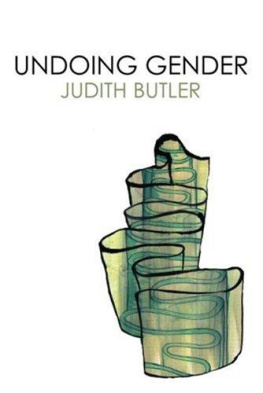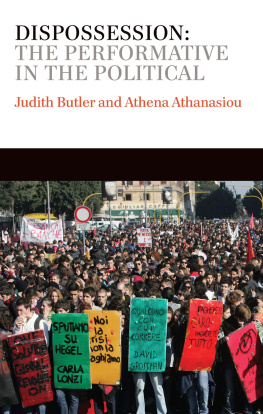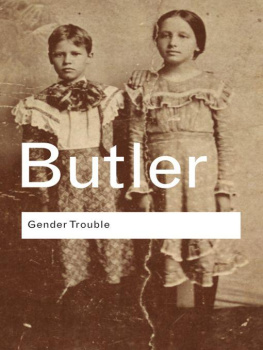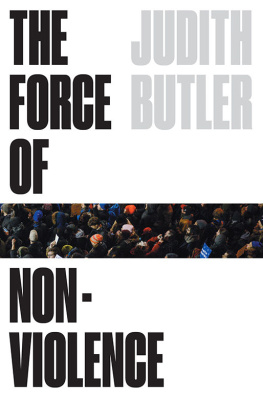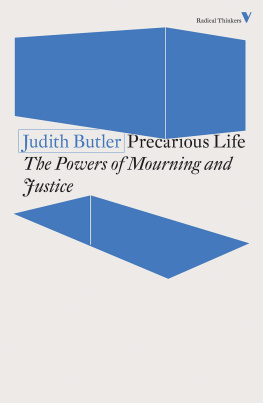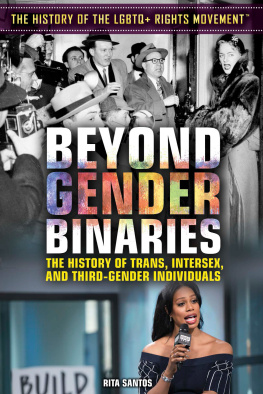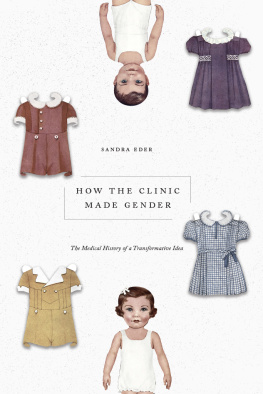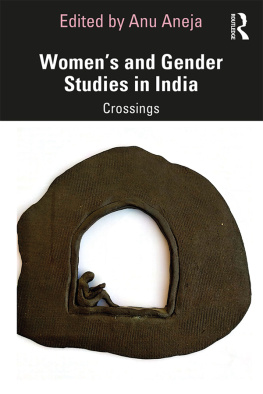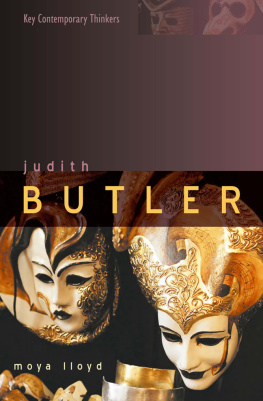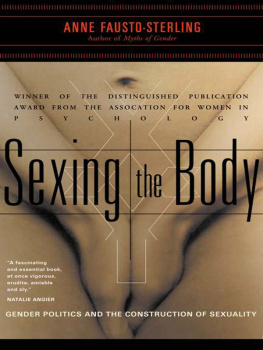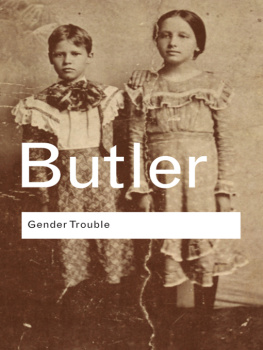Undoing Gender
Judith Butler
Routledge
New York And London
Published in 2004 by
Routledge
270 Madison Avenue
New York, NY 10016
www.routledge-ny.com
Published in Great Britain by
Routledge
2 Park Square
Milton Park
Abington, Oxfordshire, OX14 4RN, UK
www.routledge.co.uk
Copyright 2004, by Routledge
Routledge is an imprint of the Taylor & Francis Group.
Printed in the United States of America on acid-free paper.
10 9 8 7 6 5 4 3 2 1
All rights reserved. No part of this book may be reprinted or reproduced or utilized in any form or by any electronic, mechanical, or other means, now known or hereafter invented, including photocopying and recording, or in any information storage or retrieval system without permission in writing from the publisher.
Library of Congress Cataloging in Publication Data Butler, Judith.
Undoing gender/by Judith Butler.
p. cm.
Includes bibliographical references and index.
ISBN 0-415-96922-0 (alk. paper) ISBN 0-415-96923-9 (pbk.: alk. paper) 1. Sex role. 2. Gender identity, I. Title.
HQ1075.B89 2004
305.3dc22
2003066872
ISBN 0-415-96922-0 (hb)
ISBN 0-415-96923-9 (pb)
For Wendy,
again and again
Acknowledgments
My thanks go to Amy Jamgochian and Stuart Murray who helped at various stages to edit and compile these essays. I also thank Denise Riley whose conversation over these last years has moved my thinking in ways too many and too intricately to recount.
I thank Gayle Salamon as well whose dissertation on embodiment and materiality has prompted my own re-thinking on such topics.
The essay Beside Oneself was given as part of the Amnesty Lecture Series on Sexual Rights at Oxford in the spring of 2002 and will appear in an Oxford publication of those lectures edited by Nicholas Bamforth. It contains material published in Violence, Mourning, Politics, which first appeared in Studies in Gender and Sexuality 4:1
(2003). Doing Justice to Someone appeared in a different form in GLQ (7, no. 4, 2001). In revising the essay, I have incorporated suggestions made by Vernon Rosario and Cheryl Chase and am grateful to them both for the important perspectives they provided. Gender Regulations was commissioned by Gil Herdt and Catharine Stimpson for a forthcoming volume on Gender with the University of Chicago Press. Undiagnosing Gender is also in Transgender Rights: Culture, Politics, and Law , edited by Paisley Currah and Shannon Minter (Minneapolis: University of Minnesota Press, 2004). Is Kinship Always Already Heterosexual appeared first in differences (vol. 13, no. 1, spring 2002). Longing for Recognition appeared first in Studies in Gender and Sexuality (vol. 1, no. 3, 2000) and some parts of that essay appeared as well as Capacity in Regarding Sedgwick , edited by Stephen Barber (New York: Routledge, 2001). Quandaries of the Incest Taboo appeared in Whose Freud? The Place of Psychoanalysis in Contemporary Culture , edited by Peter Brooks and Alex Woloch (New Haven: Yale University Press, 2000). Bodily Confessions was given as a paper at the American Psychological Division Meetings (Division 39) in San Francisco in the spring of 1999. The End of Sexual Difference? appeared in different form in Feminist Consequences: Theory for a New Century , edited by Misha Kavka and Elizabeth Bronfen (New York: Columbia University Press, 2001). The Question of Social Transformation appeared in a longer version in Spanish in Mujeres y transformaciones sociales , with Lidia Puigvert and Elizabeth Beck Gernsheim (Barcelona: El Roure Editorial, 2002). Can the Other of Philosophy Speak? was published in Schools of Thought: Twenty-Five Years of Interpretive Social Science , edited by Joan W. Scott and Debra Keates (Princeton: Princeton University Press, 2002) and appeared in a separate version in Women and Social Transformation (New York: Peter Lang Publishing, 2003).
Introduction: Acting in Concert
The essays included here represent some of my most recent work on gender and sexuality focusing on the question of what it might mean to undo restrictively normative conceptions of sexual and gendered life. Equally, however, the essays are about the experience of becoming undone in both good and bad ways. Sometimes a normative conception of gender can undo ones personhood, undermining the capacity to persevere in a livable life. Other times, the experience of a normative restriction becoming undone can undo a prior conception of who one is only to inaugurate a relatively newer one that has greater livability as its aim.
If gender is a kind of a doing, an incessant activity performed, in part, without ones knowing and without ones willing, it is not for that reason automatic or mechanical. On the contrary, it is a practice of improvisation within a scene of constraint. Moreover, one does not do ones gender alone. One is always doing with or for another, even if the other is only imaginary. What I call my own gender appears perhaps at times as something that I author or, indeed, own.
But the terms that make up ones own gender are, from the start, outside oneself, beyond oneself in a sociality that has no single author (and that radically contests the notion of authorship itself).
Although being a certain gender does not imply that one will desire a certain way, there is nevertheless a desire that is constitutive of gender itself and, as a result, no quick or easy way to separate the life of gender from the life of desire. What does gender want? To speak in this way may seem strange, but it becomes less so when we realize that the social norms that constitute our existence carry desires that do not originate with our individual personhood. This matter is made more complex by the fact that the viability of our individual personhood is fundamentally dependent on these social norms.
The Hegelian tradition links desire with recognition, claiming that desire is always a desire for recognition and that it is only through the experience of recognition that any of us becomes constituted as socially viable beings. That view has its allure and its truth, but it also misses a couple of important points. The terms by which we are recognized as human are socially articulated and changeable. And sometimes the very terms that confer humanness on some individuals are those that deprive certain other individuals of the possibility of achieving that status, producing a differential between the human and the less-than-human.
These norms have far-reaching consequences for how we understand the model of the human entitled to rights or included in the participatory sphere of political deliberation. The human is understood differentially depending on its race, the legibility of that race, its morphology, the recognizability of that morphology, its sex, the perceptual verifiability of that sex, its ethnicity, the categorical understanding of that ethnicity. Certain humans are recognized as less than human, and that form of qualified recognition does not lead to a viable life. Certain humans are not recognized as human at all, and that leads to yet another order of unlivable life. If part of what desire wants is to gain recognition, then gender, insofar as it is animated by desire, will want recognition as well. But if the schemes of recognition that are available to us are those that undo the person by conferring recognition, or undo the person by withholding recognition, then recognition becomes a site of power by which the human is differentially produced.
This means that to the extent that desire is implicated in social norms, it is bound up with the question of power and with the problem of who qualifies as the recognizably human and who does not.
If I am a certain gender, will I still be regarded as part of the human?
Will the human expand to include me in its reach? If I desire in certain ways, will I be able to live? Will there be a place for my life, and will it be recognizable to the others upon whom I depend for social existence?
Next page
